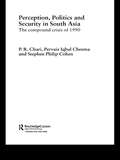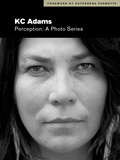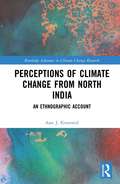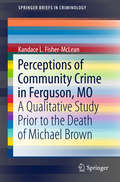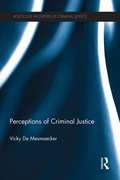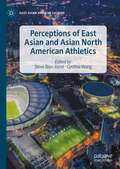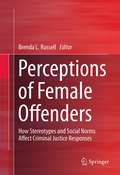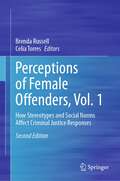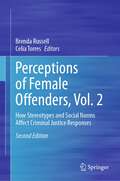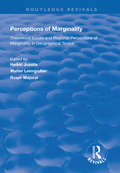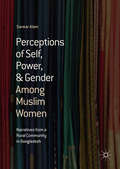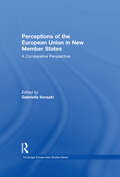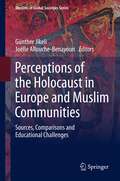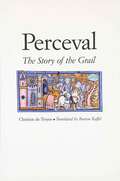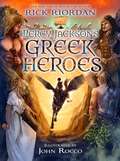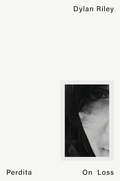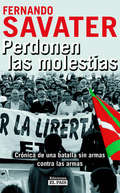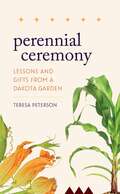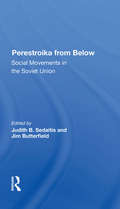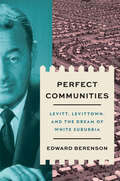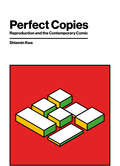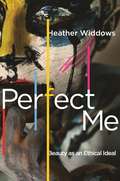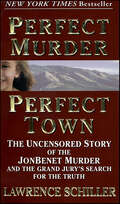- Table View
- List View
Perception, Politics and Security in South Asia: The Compound Crisis of 1990 (Routledge Advances in South Asian Studies #No.1)
by P R Chari Pervaiz Iqbal Cheema Stephen P CohenThis book provides a detailed examination of the compound crisis between India and Pakistan that brought the region to the brink of a nuclear war in 1990. Placing the crisis in the context of concurrent international events such as the fall of the Soviet Union, the authors draw out the lesson for present-day South Asian affairs. The book also makes a significant contribution to the debates on the role of nuclear weapons, confidence and security building strategies and the place of ethnicity in contemporary international relations.
Perception: A Photo Series
by KC AdamsTired of reading negative and disparaging remarks directed at Indigenous people of Winnipeg in the press and social media, artist KC Adams created a photo series that presented another perspective. Called &“Perception Photo Series,&” it confronted common stereotypes of First Nation, Inuit and Métis people to illustrate a more contemporary truthful story. First appearing on billboards, in storefronts, in bus shelters, and projected onto Winnipeg&’s downtown buildings, Adams&’s stunning photographs now appear in the book, Perception: A Photo Series. Meant to challenge the culture of apathy and willful ignorance about Indigenous issues, Adams hopes to unite readers in the fight against prejudice of all kinds.Perception is one title in The Debwe Series.
Perception: A Photo Series
by KC AdamsTired of reading negative and disparaging remarks directed at Indigenous people of Winnipeg in the press and social media, artist KC Adams created a photo series that presented another perspective. Called &“Perception Photo Series,&” it confronted common stereotypes of First Nation, Inuit and Métis people to illustrate a more contemporary truthful story. First appearing on billboards, in storefronts, in bus shelters, and projected onto Winnipeg&’s downtown buildings, Adams&’s stunning photographs now appear in the book, Perception: A Photo Series. Meant to challenge the culture of apathy and willful ignorance about Indigenous issues, Adams hopes to unite readers in the fight against prejudice of all kinds.Perception is one title in The Debwe Series.
Perceptions of Climate Change from North India: An Ethnographic Account (Routledge Advances in Climate Change Research)
by Aase J. KvanneidPerceptions of Climate Change from North India: An Ethnographic Account explores local perceptions of climate change through ethnographic encounters with the men and women who live at the front line of climate change in the lower Himalayas. From data collected over the course of a year in a small village in an eco-sensitive zone in North India, this book presents an ethnographic account of local responses to climate change, resource management and indigenous environmental knowledge. Aase Kvanneid’s observations cast light on the precarious reality of climate change in this region and bring to the fore issues such as access to water, NGO intervention and climate information for farmers. In doing so, she also explores classic topics in the study of rural India including ritual, gender, social hierarchy and political economy. Overall, this book shows how the cause and effect of climate change is perceived by those who have the most to lose and explores how the impact of climate change is being dealt with on a local and global scale. This book will be of great interest to students and scholars of the anthropology of climate change, environmental sociology and rural development.
Perceptions of Community Crime in Ferguson, MO
by Kandace L. Fisher-McLeanThis Brief is based on a research study of aging adults' perceptions and fear of crime in their community of Ferguson, Missouri. The study, which was conducted by coincidence just prior to the death of Michael Brown, presents unique insights into the community environment prior to those events, which sparked protests and turmoil in Ferguson and beyond. This qualitative study employs sampling and semi-structured interviews to survey older adults aging in place in Ferguson about their perceptions of crime, social disorder, racial integration and community transformation. The author also draws comparisons to other US cities, and recommendations for future research. While the study is only preliminary, it will be of interest to anyone researching the intersection of race, crime, and community, or particularly the protests surrounding the events in Ferguson, Missouri, as a starting point for comparison.
Perceptions of Criminal Justice: Perceptions Of Criminal Justice (Routledge Frontiers of Criminal Justice)
by Vicky De MesmaeckerIn recent decades, research into the legitimacy of criminal justice has convincingly demonstrated the importance of procedural justice to citizens’ sense of trust and confidence in legal authorities and their resulting willingness to conform to the law and cooperate with the legal authorities. Reversing the age-old question ‘why do people break the law?’, theories of procedural justice have provided insight into the factors that encourage people to abide by the law, suggesting that experiences of procedural fairness are crucial to achieving compliance with the law and to enhancing the legitimacy of criminal justice. While these studies are important in showing that legal authorities need to pay attention to the fairness judgements of the people involved in legal procedures, the focus on showing the importance of procedural justice has had the ironic consequence of distracting researchers from studying the equally important question of what fairness means to the people involved in legal proceedings. In one of the first studies on procedural justice to use a qualitative research design, the author provides the reader with detailed and insightful descriptions of the elements that determine how victims and defendants assess the fairness of their contact with the police and the courts. Focusing on both the pre-trial and the post-trial phases, this book will be of interest to academics and students engaged in the study of the psychology of law, procedural justice and the legitimacy of criminal justice.
Perceptions of East Asian and Asian North American Athletics (East Asian Popular Culture)
by Cynthia Wang Steve Bien-AiméThis book highlights inconsistencies within the field of sports scholarship and provides an opportunity to open up and extend conversations about the intersection of sports media and race — particularly surrounding athletes of East Asian descent. Despite the growing influence of East Asian and Asian American/Canadian athletes, they are still underrepresented in Western media and in scholarship. This anthology adds much-needed literature to sports, popular culture, East Asian, and Asian American studies. The prominence of sports in global popular culture makes the intersections explored in this collection a crucial addition to existing conversations about both sports and East Asian/Asian American/Canadian studies.
Perceptions of Female Offenders
by Brenda RussellFemale offenders are often perceived as victims who commit crimes as a self-defense mechanism or as criminal deviants whose actions strayed from typical 'womanly' behavior. Such cultural norms for violence exist in our gendered society and there has been scholarly debate about how male and female offenders are perceived and how this perception leads to differential treatment in the criminal justice system. This debate is primarily based upon theories associated with stereotypes and social norms and how these prescriptive norms can influence both public and criminal justice response. Scholars in psychology, sociology, and criminology have found that female offenders are perceived differently than male offenders and this ultimately leads to differential treatment in the criminal justice system. This interdisciplinary book provides an evidence based approach of how female offenders are perceived in society and how this translates to differential treatment within the criminal justice system and explores the ramifications of such differences. Quite often perceptions of female offenders are at odds with research findings. This book will provide a comprehensive evidence-based review of the research that is valuable to laypersons, researchers, practitioners, advocates, treatment providers, lawyers, judges, and anyone interested in equality in the criminal justice system.
Perceptions of Female Offenders, Vol. 1: How Stereotypes and Social Norms Affect Criminal Justice Responses
by Brenda Russell Celia TorresThis first volume of the second edition builds on the many developments made to the study of female offenders, compiling new insights and evidence-based research. With new cases such as Amber Heard and Johnny Depp, it further explores topics including the role of social media in how female offenders are portrayed, juvenile offenders, female aggression in young adults, female perpetrators of domestic violence and more. This book begins with new research on gender stereotypes, disruptive behavior, female aggression, the impact of American media and culture, and gender stereotypes and how they relate to female offending. It examines more diverse topics to include greater intersectionality of female perpetrators in terms of age, race, ethnicity, and sexual identity, and country. Additionally, it provides a comprehensive evidence-based review of the research that is valuable to researchers, practitioners, and advocates interested in equality in the criminal justice system.
Perceptions of Female Offenders, Vol. 2: How Stereotypes and Social Norms Affect Criminal Justice Responses
by Brenda Russell Celia TorresThis new edition is a nuanced exploration of female involvement in various crimes—from delinquency, domestic violence, sexual assault and homicide—that resonates with the pulse of contemporary society. In an age where many events are tweeted and debated online, this book delves into the intricate ways social media portrays female offenders and how this can distort public perceptions and effect legal outcomes. Volume two includes recent research and theory examining how female perpetration is intricately related to gender roles that persist within the criminal justice system and often lead to gender disparities in treatment, criminal justice response, and sentencing and calls into question long-held beliefs and systems that might not be as impartial as they appear. The compelling nature of this volume addresses the complex relationship between trauma and offending and examines crucial subjects like partner violence homicide and the unique challenges faced by trans-women within the criminal justice system, and examines the myths associated with female offending and how that bleeds into criminal justice response. It addresses theories that provide insight into female offending and sentencing and offers ways to generate gender inclusiveness. This volume invites researchers, practitioners, and advocates for justice to join a vital conversation and develop a more informed and equitable criminal justice response.
Perceptions of Marginality: Theoretical Issues and Regional Perceptions of Marginality in Geographical Space (Routledge Revivals)
by Walter Leimgruber Heikki Jussila Roser MajoralFirst published in 1998, this volume takes an international approach theoretical and regional perceptions and experiences of marginality along with some key case studies in Arctic North America, Greenland, Aboriginal Australia and the Republic of Ireland. Its contributors are geographers from all over the world. It is part of a series which aims to publish new scientific work on the dynamism of the marginal and critical regions of the world and concentrates on understanding marginality and its processes, the human process and its agents, comparative approaches and different policy responses to economic, social and environmental problems along with studying the human response to global change and its implications for marginalization.
Perceptions of Self, Power, & Gender Among Muslim Women: Narratives from a Rural Community in Bangladesh
by Sarwar AlamThis book analyzes perceptions of self, power, agency, and gender of Muslim women in a rural community of Bangladesh. Rural women’s limited power and agency has been subsumed within the male dominated Islamic discourses on gender. However, many Muslim women have their own alternative discourses surrounding power and agency. Sarwar Alam intertwines an exploration of these power dynamics with reading of the Qur’an and Hadith, and analyzes how Muslim women’s perception of power and gender are linked to their relationship with religion.
Perceptions of the European Union in New Member States: A Comparative Perspective (Routledge Europe-Asia Studies)
by Gabriella IlonszkiThe book explores the views of elites alongside those of the wider population in the European Union. The chapters place the new member states – and the potential candidate Serbia – on the map of Europe in this context for the first time. The volume's comparative method goes beyond the standard old member states versus new member states divide. It assesses regional differences within Central Europe and evaluates the problem of European and national identity formation, perception of external threats to the EU (including Russia), differences between economic and political elite views about the integration process and the connection between national performance and public opinion about Europe. Even though, in each country, positive views are dominant about the integration process, heterogeneous views prevail behind the image of a unifying Europe.The book’s major contribution is that it makes the new member states more visible and provides hard evidence while remaining theoretically driven. Furthermore, it covers the most important topics that emerge in studies concerning European integration. The book is intended for those interested in European integration in general but Central and Eastern European comparativists will find it particularly useful.This book was published as a special issue of Europe-Asia Studies.
Perceptions of the Holocaust in Europe and Muslim Communities
by Günther Jikeli Joëlle Allouche-BenayounThe way people think about the Holocaust is changing. The particular nature of the transformation depends on people's historical perspectives and how they position themselves and their nation or community vis-à-vis the tragedy. Understandably, European Muslims perceive the Holocaust as less central to their history than do other Europeans. Yet while the acknowledgement and commemoration of the horrors of the Holocaust are increasingly important in Europe, Holocaust denial and biased views on the Holocaust are widespread in European Muslims' countries of origin. In this book, a number of distinguished scholars and educators of various backgrounds discuss views of the Holocaust. Problematic views are often influenced by a persistent attitude of Holocaust denial which is derived, in part, from discourses in the Muslim communities in their countries of origin. The essays collected here explore the backgrounds of these perceptions and highlight positive approaches and developments. Many of the contributions were written by people working in the field and reflecting on their experiences. This collection also reveals that problematic views of the Holocaust are not limited to Muslim communities.
Perceval: The Story of the Grail
by Chrétien de Chrétien de TroyesOne of the most influential storytellers in Western literature, French poet Chrétien de Troyes helped to shape the ever-fascinating legend of King Arthur and the Round Table. Of Chrétien's five surviving romantic Arthurian poems, the last and longest is Perceval, an unfinished work that introduces the story of the Grail―a legend quickly adopted by other medieval writers and taken up by a continuing succession of authors. In Chrétien's romance, Perceval progresses from a naive boyhood in rural seclusion to a position of high respect as a knight at Arthur's court. With the help of two teachers―his mother and Gornemant of Goort―Perceval is ultimately able to reject the worldly adventures chosen by other knights and seek important moral and spiritual answers. <p><p> Acclaimed for his sensitive and faithful translations of the poems of Chrétien, Burton Raffel completes the Arthurian series with this rendition of Perceval. Raffel conveys to the modern English language reader all the delights of Chrétien’s inventive storytelling, perceptive characterizations and vividly evoked emotions.
Percy Jackson and the Olympians: The Official Cookbook
by Jarrett MelendezDine like a demigod with over 60 recipes fit to be served anywhere from Camp Half-Blood to Mount Olympus in the only official collection developed for fans of the books and the Disney+ Original Series.Make any meal an epic offering to your friends and family, with mythical recipes inspired by Percy Jackson and the Olympians. Filled with delicious dishes straight from Sally Jackson&’s kitchen, Aunty Em&’s Garden Gnome Emporium, Waterland, and beyond, this cookbook is a hero&’s culinary journey of its own. Featuring instructions from Grover Underwood, helpful tips and tricks from Annabeth Chase, plus full-color photography, this deluxe recipe book has all the essentials to see any home-chef fulfill their destiny. Not to mention a whole host of blue dishes, designed with love, to bring your community together over a dinner that looks as good as it tastes. QUEST YOUR WAY THROUGH OVER 60 RECIPES: Serve up dozens of appetizers, main courses, desserts, and beverages with roots in both classic Greek and American-style cuisines. BRING CAMP HALF-BLOOD TO YOUR HOME: From enchiladas to ambrosia, cook up dishes that bring the unique magic of Percy Jackson&’s world right to your kitchen. SEE PAST THE MIST WITH FULL-COLOR PHOTOGRAPHY: Stunning images throughout this cookbook reveal mythically good meals. PERFECT FOR ALL SKILL LEVELS: Great for beginners and experienced chefs alike, this cookbook will help you prepare amazing dishes for your friends and family inspired by your favorite gods and heroes. GIFTABLE & COLLECTIBLE: As the only officially licensed cookbook for the TV series, this is a must-have for any fan looking to capture the myth and the magic for themselves.
Percy Jackson's Greek Heroes (Percy Jackson and the Olympians)
by Rick Riordan John RoccoWho cut off Medusa's head? Who was raised by a she-bear? Who tamed Pegasus? It takes a demigod to know, and Percy Jackson can fill you in on the all the daring deeds of Perseus, Atalanta, Bellerophon, and the rest of the major Greek heroes. Told in the funny, irreverent style readers have come to expect from Percy, (I've had some bad experiences in my time, but the heroes I'm going to tell you about were the original old school hard luck cases. They boldly screwed up where no one had screwed up before. . . ) and enhanced with vibrant artwork by Caldecott Honoree John Rocco, this story collection will become the new must-have classic for Rick Riordan's legions of devoted fans--and for anyone who needs a hero. So get your flaming spear. Put on your lion skin cape. Polish your shield and make sure you've got arrows in your quiver. We're going back about four thousand years to decapitate monsters, save some kingdoms, shoot a few gods in the butt, raid the Underworld, and steal loot from evil people. Then, for dessert, we'll die painful tragic deaths. Ready? Sweet. Let's do this.
Perdita: On Loss
by Dylan RileyAn intense literary memoir of love and grief&“Our marriage was, from any conventional point of view, wildly implausible; and you, my dear son, are the miraculous product of this beautiful, rather crazy, and all too brief love affair.&” When Dylan Riley received the devastating news that his wife, Emanuela, had cancer, he turned to writing to express the anguish and disarray brought by her worsening symptoms and then her passing. Perdita, composed for their teenage son, Eamon, is the result of this attempt to represent loss. It is at once a portrait of youth, a lyrical memoir of a marriage, and a raw and moving account of bereavement.Riley describes cancer, Perdita&’s central antagonist, as a pitiless opponent, draining hope of its power and reducing it to self-delusion. Its course forces a progressive foreshortening of time. Next year might be terrible, but there can be a few good months now; tomorrow will likely be bad, but let&’s focus on today.In this memoir, the disease provokes a broader set of reflections on the openness, contingency, and pain of the human condition, a status defined by the context of mortality, both our own and that of those we love.
Perdonen las molestias: Crónica de una batalla sin armas contra las armas
by Fernando SavaterEste libro es la crónica de una batalla sin armas contra las armas. Desde el asesinato de Miguel Ángel Blanco hasta nuestros días, reúne los artículos -a la vez combativos y explicativos- publicados por Fernando Savater sobre el terrorismo nacionalista en el País Vasco, así como el debate polémico de sus habituales justificaciones ideológicas. Es un testimonio juntamente reflexivo y apasionado del compromiso cívico de un intelectual ante la violencia. Pero con frecuencia estos breves ensayos van más allá de las circunstancias del terrorismo en el País Vasco y configuran una meditación necesaria sobre el sentido de la democracia moderna, los derechos de la ciudadanía, la defensa del Estado garantista en Europa y las extralimitaciones de algunos guardianes demasiado celosos, etc. Una perspectiva diferente para quienes no se sientan indiferentes.
Perennial Ceremony: Lessons and Gifts from a Dakota Garden
by Teresa PetersonTravel through a garden&’s seasons toward healing, reclamation, and wholeness—for us, and for our beloved relative, the Earth In this rich collection of prose, poetry, and recipes, Teresa Peterson shares how she found refuge from the struggle to reconcile her Christianity and Dakota spirituality, discovering solace and ceremony in communing with the earth. Observing and embracing the cycles of her garden, she awakens to the constant affirmation that healing and wellness can be attained through a deep relationship with land, plants, and waters. Dakota people call this way of seeing and being in the world mitakuye owasin: all my relations. Perennial Ceremony brings us into this relationship, as Peterson guides us through the Dakota seasons to impart lessons from her life as a gardener, gatherer, and lover of the land. We see the awakening of Wetu (spring), a transitional time when nature comes alive and sweet sap flows from maples, and the imperfect splendor of Bdoketu (summer), when rain becomes a needed and nourishing gift. We share in the harvesting wisdom of Ptaŋyetu (fall), a time to savor daylight and reap the garden&’s abundance, and the restorative solitude of Waniyetu (winter), when snow blankets the landscape and sharpens every sound. Through it all, Peterson walks with us along the path that both divides and joins Christian doctrine, everyday spiritual experience, and the healing powers of Indigenous wisdom and spirituality. In this intimate seasonal cycle, we learn how the garden becomes a healing balm. Peterson teaches us how ceremony may be found there: how in the vegetables and flowers, the woods, the hillsides, the river valley—even in the feeding of friends and family—we can reclaim and honor our relationship with Mother Earth. She encourages us to bring perennial ceremony into our own lives, inviting us on a journey that brings us full circle to makoce kiŋ mitakuye: the land is my relative.
Perestroika From Below: Social Movements In The Soviet Union
by Judith Sedaitis Jim ButterfieldThis book represents the first comprehensive assessment of the world of social movements and collective action in the Soviet Union, and provides the information to expand our knowledge and potentially our comprehension of the dramatic processes taking place.
Perfect Communities: Levitt, Levittown, and the Dream of White Suburbia
by Edward BerensonThe rise and fall of William J. Levitt, the man who made the suburban house a mass commodity Two material artifacts defined the middle-class American lifestyle in the mid-twentieth century: the automobile, which brought gas stations, highways, commercial strips, and sprawl; and the single-family suburban home, the repository of many families&’ long-term wealth. While the man who did the most to make the automobile a mass commodity—Henry Ford—is well known, few know the story of the man who did the same for the suburban house. Edward Berenson describes the remarkable career of William Levitt, who did more than anyone else to create the modern suburb. In response to an unprecedented housing shortage as veterans returned home from World War II, his Levittown developments provided inexpensive mass-produced housing that was wildly popular—prospective buyers would camp out in line for two days for the chance to put down a deposit on a Levitt house. He was a celebrity, a life-changing hero to tens of thousands, and the pitchman of a renewed American Dream. But Levitt also shared Ford&’s dark side. He refused to allow Black people to buy or rent in his developments and doggedly defended this practice against legal challenges. Leading the way for other developers who emulated his actions, he helped ensure that suburbs nationwide remained white enclaves. These legacies are still with us. Levitt made a major contribution to the stubborn wealth disparity between white families and Black families, and his solution to the housing crisis of the 1940s—the detached house and surrounding yard—is a primary cause of the housing crisis today. As a person, Levitt was a strangely guileless and tragic figure. He accumulated vast wealth but, after losing control of his building company, surrendered it all through foolish investments and a lavish lifestyle that included a Long Island mansion and a two-hundred-foot yacht. Just weeks before his death, as a charity patient in a hospital to which he had once given millions, he was still imagining his great comeback.
Perfect Copies: Reproduction and the Contemporary Comic
by Shiamin KwaAnalyzing the way that recent works of graphic narrative use the comics form to engage with the “problem” of reproduction, Shiamin Kwa’s Perfect Copies reminds us that the mode of production and the manner in which we perceive comics are often quite similar to the stories they tell. Perfect Copies considers the dual notions of reproduction, mechanical as well as biological, andexplores how comics are works of reproduction that embed questions about the nature of reproduction itself. Through close readings of the comics My Favorite Thing Is Monsters by Emil Ferris, The Black Project by Gareth Brookes, The Generous Bosom series by Conor Stechschulte, Sabrina by Nick Drnaso, and Panther by Brecht Evens, Perfect Copies shows how these comics makers push the limits of different ideas of “reproduction” in strikingly different ways. Kwa suggests that reading and thinking about books like these, that push us to engage with these complicated questions teaches us how to become better readers.
Perfect Me: Beauty as an Ethical Ideal
by Heather WiddowsHow looking beautiful has become a moral imperative in today’s worldThe demand to be beautiful is increasingly important in today's visual and virtual culture. Rightly or wrongly, being perfect has become an ethical ideal to live by, and according to which we judge ourselves good or bad, a success or a failure. Perfect Me explores the changing nature of the beauty ideal, showing how it is more dominant, more demanding, and more global than ever before.Heather Widdows argues that our perception of the self is changing. More and more, we locate the self in the body--not just our actual, flawed bodies but our transforming and imagined ones. As this happens, we further embrace the beauty ideal. Nobody is firm enough, thin enough, smooth enough, or buff enough—not without significant effort and cosmetic intervention. And as more demanding practices become the norm, more will be required of us, and the beauty ideal will be harder and harder to resist.If you have ever felt the urge to "make the best of yourself" or worried that you were "letting yourself go," this book explains why. Perfect Me examines how the beauty ideal has come to define how we see ourselves and others and how we structure our daily practices—and how it enthralls us with promises of the good life that are dubious at best. Perfect Me demonstrates that we must first recognize the ethical nature of the beauty ideal if we are ever to address its harms.
Perfect Murder, Perfect Town: The Uncensored Story of the JonBenet Murder and the Grand Jury's Search for the Truth
by Lawrence SchillerIn Perfect Murder, Perfect Town, Lawrence Schiller thoroughly recreates every aspect of the complex case of the death of JonBenét Ramsey. A brilliant portrait of an inscrutable family thrust under the spotlight of public suspicion and an affluent, tranquil city torn apart by a crime it couldn't handle, Perfect Murder, Perfect Town uncovers the mysteries that have bewildered the nation.Why were the Ramseys, the targets of the investigation, able to control the direction of the police inquiry?Can the key to the murder be found in the pen and writing pad used for the ransom note?Was it possible for an intruder to have killed JonBenét?
